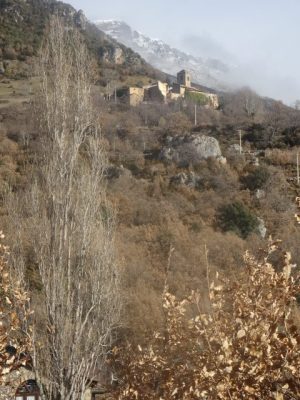New Year in another country

Petina Gappah – photograph from the Guardian interview
On New Year’s Day we fled from France across the snow-covered Pyrenees pursued by stormy winds and heavy rain. There we wandered along empty twisting roads among ruined and isolated stone villages and ancient monasteries in the brutal mountains of Spanish Aragon. In our hotel room the television showed no news and told no stories so we were free to lie down in silence and read the books we unpacked from our suitcases. John was reading Lost History, a book about the culture and science of Islam. I was reading Petina Gappah‘s The Book of Memory, published by Faber and Faber and long-listed for the Baileys women’s prize for fiction. I was soon so absorbed into the story that I couldn’t put the book down and we were almost too late to get supper. In Spain supper goes on so late that missing it is nearly impossible. It’s an indication of how much I was enjoying The Book of Memory that we nearly didn’t have our bottle of rioja and our dishes of beans and sausage.
Africa begins at the Pyrenees

The oldest monastery in Spain in the Pyrenees in Aragon
I’ve liked going to Spain since I first heard this quote because I want to feel close to Africa – close to the places I love. Zimbabwe, where I was born, Zambia where I lived so happily, and Cape Town where I went to art school. The origin of the quote is disputed. It is mythic, complex and shocking. The quotation is attributed variously to Louis XIV, Napoleon, Voltaire and Alexandre Dumas, who was himself of mixed race. Hemingway, too, uses the phrase in one of his stories. It seems that it is, in fact, suggesting that the Spanish people are “other” than European. In their culture, the manner of their civilisation, and their dark colour they “belong” to Africa and not to pale Europe. The idea is racist and about conflict and that makes me sad. My roots are on the “African ” side of the Pyrenees and of that, I am proud and glad. Petina Gappah is a novelist whose life’s experiences mean that she understands all these problems and weaves them skilfully into her novels and short stories. She is a very sophisticated writer. Her touch is light. Her characters individuals who delight the reader.
A rich complex story which is simply and well told
A female prison officer talks to prisoners waiting for release at Chikarubi Prison
A jubilant woman prisoner leaving Chikarubi after the amnesty for prisonersThe hero of the story Memory, is an albino woman held in Chikarubi Prison in Zimbabwe. She has been sentenced to death by hanging for the murder of her benefactor, Lloyd, a white man. This is her story constructed from what she can remember of her extraordinary life lived first among the poor and then among the affluent of Harare. In this story Petina Gappah gave me a huge and generous gift. She gave me back all that I love most about my part of Africa – Zimbabwe and Zambia. Its women, its men, their wonderful sense of humour, its rich and vital life, its music and laughter, its darknesses and its light and love and the mixedness of all its peoples. I will write a review of the book on Amazon but in this post I have wanted to say why this book is so important for me.
Even my own post from my own memoir of my Zimbabwe childhood seems more meaningful after reading The Book of Memory.
A time of change and of new hope
It is the passion, the dedication, the hard work and the humanity of writers like Petina Gappah that give me hope and that keep alive the spirit of freedom against the odds. Things have changed and are changing in Zimbabwe. I remember my despair at the election of Ian Smith and at the Unilateral Declaration of Independence in Rhodesia, the long painful years of the liberation wars and the exultation we felt when Zimbabwe finally became independent under Robert Mugabe. The disappointment as those hopes turned into bitterness and dust and the tears that I cried when at last Mugabe resigned and I knew Zimbabwe would begin to renew itself as its people deserve.
2 Comments on “The Book of Memory by Petina Gappah”
But ZIMBABWE didn’t manage to renew itself.
Hi Lorraine,
You’re right. Zimbabwe hasn’t renewed itself. I republished this post from 2018 and I’ll alter that last bit. Thank you for your comment.
My mistake.
Ruth